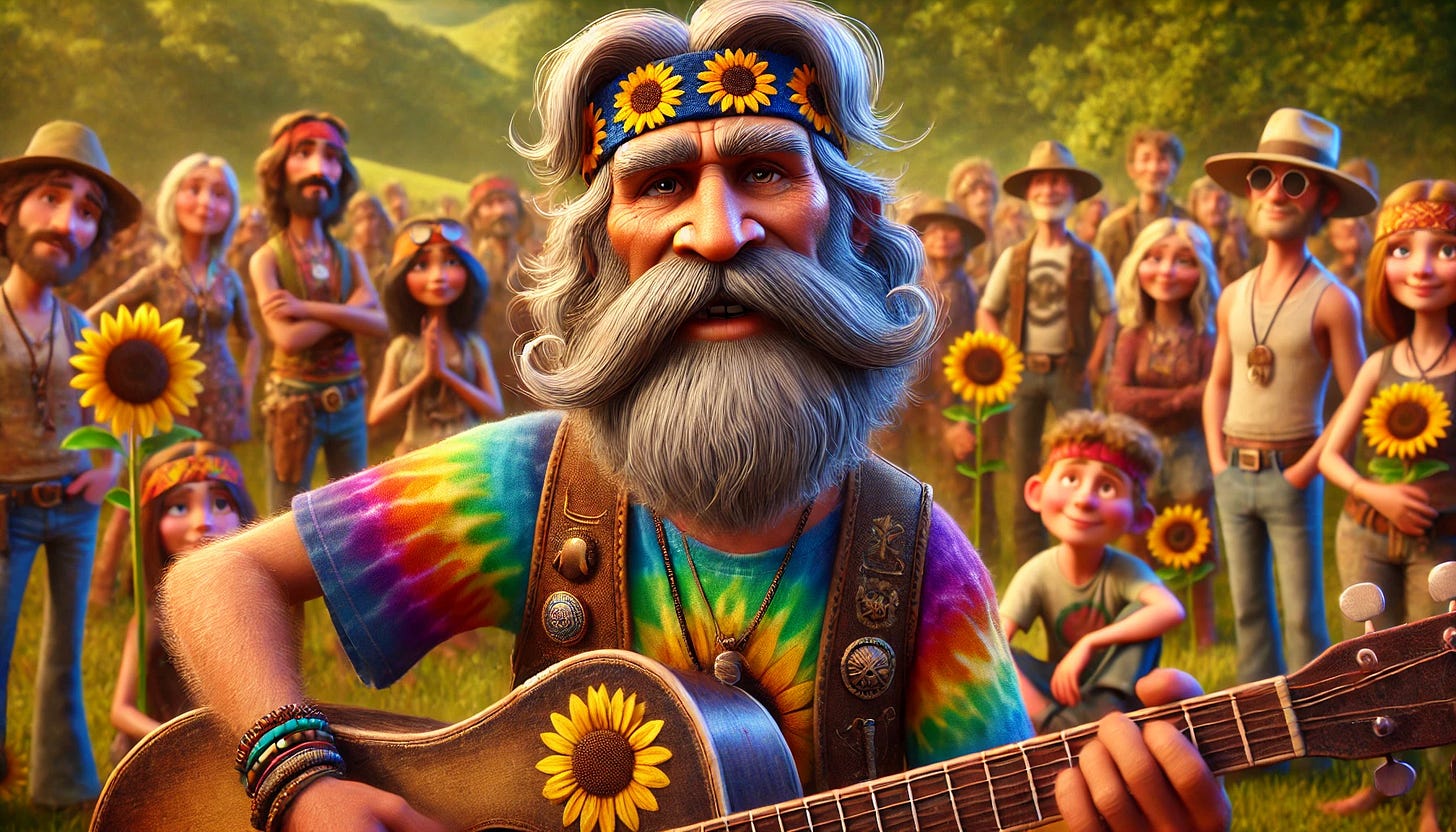Chapter Two: The Return of Floyd’s Cosmic Nonsense
To Floyd’s surprise, his notes began to take on a life of their own. People found them, shared them, and even started collecting them as if they were pieces of cryptic wisdom.
Floyd "Sunflower" McGurgle sat in the parking lot of a discount grocery store, surrounded by shopping carts like a makeshift army of steel and plastic. His trusty bean bag chair—now frayed around the edges—had found a new home atop the faded asphalt. A light breeze swirled around him, carrying with it the faint scent of pine trees, processed cheese, and diesel fumes. In his hand, a pink sticky note flapped in the wind. On it, he had scrawled his latest revelation: “The wind is just a tree whispering secrets from the clouds.”
Passersby glanced at him curiously, but he paid them no mind. Floyd was deep in a cosmic trance, his mustache twitching with every mental leap. While the rest of the world had moved on from the Substack collapse, Floyd’s bizarre sense of mission had only intensified. He no longer had a digital platform, but that didn’t matter. The universe had given him a new one: anywhere sticky notes could be stuck.
His campaign had spread from grocery stores to bus stops, park benches, and even the occasional ATM. Floyd’s notes were everywhere. Some were short and sweet—“Don’t trust a mushroom with a bowtie”—while others stretched the limits of human comprehension: “If time is a hamster wheel, who is the hamster and why does it wear flip-flops in December?”
To Floyd’s surprise, his notes began to take on a life of their own. People found them, shared them, and even started collecting them as if they were pieces of cryptic wisdom. Someone even posted photos of them on social media with the hashtag #SunflowerSightings, turning Floyd into an underground sensation. Suddenly, his audience wasn’t just a few curious shoppers or confused bank customers; his gibberish was going viral again.
But this time, things were different. The gibberish wasn’t destroying platforms. Instead, it became a movement. A new kind of community grew around Floyd’s notes, full of people seeking something—perhaps clarity, perhaps distraction, or maybe just a break from the monotony of modern life. His fans started to respond in kind, scribbling their own nonsense messages and sticking them in random places.
“The moon is my pet rock. Please water it,” one note read. Another, plastered on a city bus, declared, “Toaster strudels are the philosophers of breakfast pastries.”
It was as if Floyd’s absurdity had unlocked a hidden well of creativity in people, a collective willingness to embrace the nonsensical and laugh in the face of logic. It felt liberating to some, a new kind of freedom in a world that often felt too rigid and predictable. Suddenly, chaos wasn’t a threat—it was a lifestyle.
One day, as Floyd sat in his usual spot at the grocery store parking lot, a group of people began to gather around him. They weren’t there to gawk or make fun of him. Instead, they sat in a circle, sharing their own random thoughts and cosmic musings.
“Do you think clouds ever get tired of floating and just want to sit down for once?” asked a young man in a tie-dye shirt.
“Bananas are nature’s smiley faces, but no one ever talks about it,” chimed in a woman with a sunflower crown.
Floyd smiled beneath his wizard-like beard. It wasn’t exactly what he had intended when he first started posting on Substack, but in a way, this felt better. This was real, tangible, a community of weirdos who had come together, not to change the world but to laugh at it.
But not everyone was on board with Floyd’s cosmic nonsense revolution. The shadowy conglomerate that had bought Substack noticed the strange resurgence of Floyd’s influence. The company’s CEO, a stern-faced man with an inexplicable obsession with scented candles, had grown increasingly frustrated by the #SunflowerSightings trend. He was convinced it was undermining his company’s attempt to rebrand Substack into a platform for serious, meaningful content, not a playground for cosmic nonsense.
Determined to put an end to Floyd’s influence once and for all, the conglomerate launched a secret campaign to hunt down every sticky note Floyd had ever posted. They called it “Operation StickStop.”
But as teams of men in dark suits scoured cities, malls, and grocery stores, plucking Floyd’s notes from every surface, they couldn’t keep up. His followers simply replaced them faster than they could be taken down. It was as if the more they tried to erase Floyd’s nonsense, the more people embraced it.
The world, it seemed, wasn’t ready to give up on absurdity just yet.
One day, in the midst of all this chaos, Floyd received an unexpected message. It wasn’t on a sticky note or posted on a bathroom stall. It came in the form of a letter, hand-delivered by a nervous young intern working for the conglomerate.
“Mr. McGurgle,” the letter began, “We have been watching your actions closely. While we do not agree with your methods, we cannot deny your influence. As such, we offer you a proposal: join our company as Chief Nonsense Officer. You’ll be well-compensated for your cosmic wisdom and given free rein to post your thoughts on a new platform, Substack 2.0.”
Floyd looked at the letter, then at the intern, and then back at the letter again. A mischievous grin spread across his face. “Tell your boss,” he said slowly, “that the fish dreams and jellybeans already told me where the real power is.”
The intern blinked, unsure what to make of this cryptic response. But as he scurried off, Floyd was already sticking another note to the back of his departing car: “In the end, we’re all just stardust waiting for a bus.”
Floyd “Sunflower” McGurgle, it seemed, was just getting started—again.





